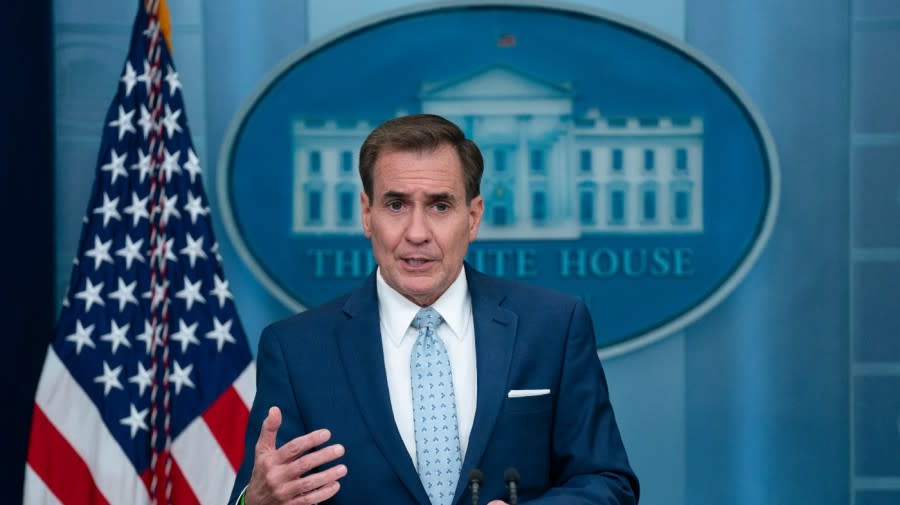
National Security Council spokesperson John Kirby on Thursday said the White House can confirm that Russia was sending Iranian drones to attack Ukraine from the Crimean peninsula, with military personnel from Tehran on the ground providing technical support and training.
The confirmation from Washington raises the stakes for the international community and United Nations to impose costs on both Russia and Iran. Kirby said the U.S. is exploring new sanctions.
This is Defense & National Security, your nightly guide to the latest developments at the Pentagon, on Capitol Hill and beyond. For The Hill, I’m foreign policy reporter Laura Kelly. A friend forward this newsletter to you? Subscribe here.
Kirby says ‘extensive proof’ Russia using Iran drones
The White House on Thursday said that Russia was launching devastating drone attacks against Ukraine from its military bases on the occupied Crimean peninsula, aided by Iranian military personnel providing technical assistance and training.
Kirby said that the U.S. cannot offer exact numbers on how many Iranians are in Crimea, adding that it’s a “relatively small number” but called Russian and Iranian denials of collusion a lie.
-
“There’s extensive proof of their use by Russia against both military and civilian targets [in Ukraine], yet both Iran and Russia continue to lie about it,” he said. “Russia has received dozens of UAVs so far, and will likely continue to receive additional shipments in the future.”
-
Kirby also raised concern that “Russia may also seek to acquire advanced conventional weapons from Iran such as surface to surface missiles that will almost certainly be used to support the war against Ukraine.”
What’s next? Kirby said that the administration is exploring “new sanctions” and that the Department of Defense is “looking actively” at potential air defense solutions for the Ukrainians.
The U.S., along with the United Kingdom, France and Ukraine, are also pushing for accountability at the United Nations, raising the issue with the Security Council that Iran’s transfer of weapons to Russia violates resolution 2231, the text that enshrined the 2015 nuclear deal.
Ukraine has called for the U.N. to send experts to examine the drones.
While resolution 2231 allows for the transfer of restricted items to or from Iran — such as weaponized drones — it’s only allowed when approved on a case-by-case basis. Drone sales to Russia were not brought before the security council.
“We are focused… on making sure we’re holding Iran and Russia accountable for these arms sales, and there are existing [UNSC resolutions], like 2231 that give us the authority to continue to sanction Iranian defense industry and that kind of thing,” Kirby said.
But how does this affect the administration’s efforts to revive the nuclear deal with Iran?
-
“Our focus right now, quite frankly… is not on the JCPOA,” Kirby said, referring to the Joint Comprehensive Plan of Action
Biden worried about Ukraine aid if GOP wins House
President Biden on Thursday said he’s concerned about the fate of aid for Ukraine if Republicans win control of Congress after House Minority Leader Kevin McCarthy (R-Calif.) signaled the party would not provide a “blank check” for Ukrainians.
“I am worried about it because they said they would cut it,” Biden told reporters during a stop in Pittsburgh.
McCarthy told Punchbowl News earlier this week that House Republicans will not write “a blank check” to Ukraine if they take control of the lower chamber next year.
MCCARTHY IS ON A COLLISION COURSE WITH SENATE GOP LEADER MCCONNELL
Senate Republican Leader Mitch McConnell (Ky.) has led Republican support for sending generous military and financial aid to Kyiv, warning that Russian President Vladimir Putin could threaten Poland and other European allies if not stopped in Ukraine.
McCarthy, who would likely become Speaker if Republicans win control of the House, is putting the brakes on more Ukraine aid, warning this week there won’t be a “blank check” from a GOP majority.
McConnell took an unannounced trip to Ukraine in May to meet with Ukrainian President Volodymyr Zelensky. He said he hoped “not many members of my party will choose to politicize this issue,” also highlighting that House Republicans voted for a $40 billion Ukraine package that month.
But House Republican support for the war in Ukraine is eroding as the conflict drags on, and experts predict the United States could be headed into a recession next year, which could diminish support for sending tens of billions of dollars in additional aid to Ukraine.
It’s the first significant policy difference between McCarthy and McConnell that will come into the spotlight after Election Day. Congress will reconvene next month to wrap up the unfinished business of the 117th Congress.
RELATED: Ukrainian defense minister brushes off McCarthy’s ‘blank check’ comments as campaign tactics
Truss’s downfall sparks talk of UK democracy decline
Questions of democratic legitimacy are swirling in the United Kingdom after the resignation on Thursday of Prime Minister Liz Truss, whose government collapsed just 44 days after she took office.
Truss’s downfall will trigger a second leadership election within the Conservative Party’s 170,000 members to pick a third prime minister for the country of 67 million this year.
Former Prime Minister Boris Johnson, another conservative, resigned in July following revelations that he’d disobeyed the U.K.’s COVID-19 regulations while the country was on lockdown.
Truss’s departure does not require a public vote to select a new government, though opposition party politicians seized on the moment to call for a general election.
-
“Constitutionally, there’s no case for a general election. There wasn’t one when Gordon Brown succeeded Tony Blair in 2007 nor in 1990 when John Major succeeded Margaret Thatcher,” British political scientist Vernon Bogdanor told the BBC Thursday. “But the political case is obviously very strong.”
Truss’s swift departure, which marks the shortest tenure of a prime minister in British history, raises questions about the institutional soundness of liberal democracies at a time when divisions between the global East and West are rising.
Those divisions are both military and economic, with NATO supporting Ukraine in its war against Russia and the U.S. rejigging major production pipelines away from China in key industries such as semiconductors.
China and Russia often relish political instability and chaos in the West, exploiting it as an opportunity to bash liberal democracies as inferior to their political systems.
Dmitri Medvedev, deputy head of Russia’s security council and a close Putin ally, tweeted “Bye, bye [Liz Truss], congrats to lettuce,” referring to a British-newspaper gimmick that was grading whether the freshness of a head of lettuce would outlast the prime minister.
The headline in China’s Global Times, considered a mouthpiece for the ruling communist party in Beijing, read “‘Shortest-serving’ Truss resigns after failed tax-cut plan, showing old Western democracy ‘cannot solve new problems.’”
-
Jonathan Katz, director of Democracy Initiatives and a senior fellow with The German Marshall Fund of the United States, said that “Political turmoil has an impact on governments’ ability to function and to react to things that are needed, whether it’s domestic or international in the case of Ukraine.”
-
He added, “Any time you have any of these key partners of Ukraine, and of the transatlantic community, going through a difficult political crisis, it can certainly have an impact on that country’s ability to continue high level support.”
ON TAP FOR TOMORROW
-
The Center for Strategic and International Studies, 10 a.m. is discussing Transatlantic Relations with French Minister for Europe and Foreign Affairs Catherine Colonna
-
The Middle East Policy Council, 10 a.m. will host its “110th Capitol Hill Conference on Iran, featuring discussion on historical context and latest developments from Washington’s leading Iran policy experts.”
-
Georgetown University’s Africa-China Initiative, 12:30 p.m., is hosting Chinese Activities and their Impacts on African Countries’ Peace and Security”
WHAT WE’RE READING
-
Economist: A big day for lettuces – Who will be Britain’s next leader?
-
Daily chart – Liz Truss is Britain’s shortest-serving prime minster. A chaotic six weeks ends in humiliating defeat:
-
World’s female foreign ministers meet to show support for Iranian women
-
DoD: Secretary of Defense Lloyd Austin says “Mental health is health – period,” following annual report on suicide in the military
-
Defense One: Why the Pentagon’s Crush on Elon Musk Is Dangerous to Democracy
-
WaPo: Former U.S. Navy leaders profited from overlapping interests on sub deal
-
WSJ: China’s Military Is Catching Up to the U.S. Is It Ready for Battle?
-
NYT: U.S. Sees Opportunity for Ukraine to Capitalize on Russian Weakness
That’s it for this week! Check out The Hill’s Defense and National Security pages for the latest coverage. See you next Monday!
For the latest news, weather, sports, and streaming video, head to The Hill.



